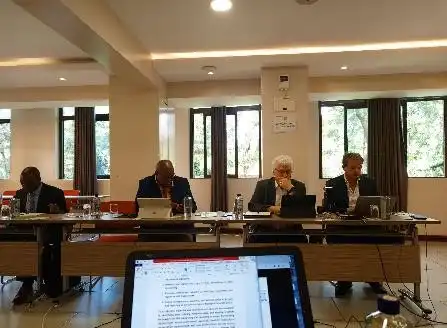News
Multi-Stakeholder Workshop on Developing a Concept for Monitoring and Reporting on the GBF & NBSAP ABS Indicators, held on 15–16 May 2025, in Machakos, Kenya
KENYA HOLDS MULTI-STAKEHOLDER WORKSHOP TO STRENGTHEN MONITORING AND REPORTING OF ABS INDICATORS UNDER THE GLOBAL BIODIVERSITY FRAMEWORK
Date: 17 May 2025
Location: Machakos, Kenya
Source: National Environment Management Authority (NEMA)
The National Environment Management Authority (NEMA), in collaboration with the ABS Capacity Development Initiative (GIZ), hosted a pivotal two-day Multi-Stakeholder Workshop on Developing a Concept for Monitoring and Reporting on the GBF & NBSAP ABS Indicators from 15–16 May 2025 at Kyaka Hotel, Machakos.
The workshop brought together representatives from key national institutions, including the Kenya Forest Service (KFS), Kenya Agricultural and Livestock Research Organization (KALRO), National Museums of Kenya (NMK), Directorate of Veterinary Services, Kenya Fisheries Service, State Department for Agriculture, and the Ministry of Culture. The event aimed at developing a coherent, data-driven, and collaborative national framework for monitoring and reporting on Access and Benefit-Sharing (ABS) indicators under Target 13 of the Kunming-Montreal Global Biodiversity Framework (GBF).
Setting the Stage for Action
The workshop was officially opened with remarks by Mr. Joseph Masinde, Acting Principal Education for Sustainable Development Officer at NEMA and ABS-CHM Desk Officer. He underscored the importance of ABS as a cornerstone of biodiversity conservation and sustainable use, stating:
“Today, we embark on a collaborative effort to strengthen Kenya’s capacity for monitoring and reporting on Access and Benefit-Sharing indicators under the Kunming-Montreal Global Biodiversity Framework. Our aim is to ensure that Kenya’s biological resources benefit both people and the planet.”
Mr. Masinde emphasized the alignment of national efforts with global commitments, particularly following the adoption of the GBF at COP 15 and the subsequent establishment of its Monitoring Framework at COP 16.
Spotlight on New ABS Regulations (2025)
The workshop came at a crucial time following the gazettement of the Environmental Management and Coordination (Access to Biological Resources and Benefit Sharing) Regulations, 2025—Legal Notice No. 68 of 2025. The new regulations modernize Kenya’s ABS framework by:
Establishing NEMA as the Competent National Authority (CNA).
Incorporating Prior Informed Consent (PIC) and Mutually Agreed Terms (MAT) in line with the Nagoya Protocol.
Enhancing the role and rights of Indigenous Peoples and Local Communities (IPLCs).
Introducing more transparent access procedures, material transfer agreements, benefit-sharing frameworks, and dispute resolution mechanisms.
Under the 2025 Regulations, access to biological resources is now location-specific, and reporting obligations have been strengthened. Users are now required to submit regular reports on research, financial transactions, intellectual property, and legal compliance.
Understanding Institutional Roles in ABS Implementation
A key highlight of the workshop was the mapping and discussion of the ABS regulatory network in Kenya, where representatives from various institutions presented their mandates and roles in the permitting, monitoring, and reporting processes. The importance of cross-sectoral collaboration was emphasized, especially among NEMA, KFS, KWS, Ministry of Culture, and NMK, who may act as sector-specific Competent National Authorities.
Drafting the National Monitoring Framework
Participants reviewed and refined a draft ABS monitoring and reporting flowchart presented by Mr. Andreas Drews from the ABS Initiative. The flowchart included key processes, stakeholder responsibilities, and potential data gaps.
In-depth sessions led by Mr. Hartmut Meyer (ABS Initiative) and Mr. Masinde facilitated critical reflection on the national gaps in ABS monitoring, including challenges with permit enforcement, data harmonization, and community engagement. These discussions laid the foundation for a national concept on ABS monitoring and reporting, aligned with NBSAP indicators and the GBF.
Linking ABS with Kenya’s NBSAP Revision Process
The workshop also offered an update on the ongoing revision of Kenya’s National Biodiversity Strategy and Action Plan (NBSAP) 2025–2030, which began in August 2023. Through support from the Ministry of Environment, GEF Early Action Support project, and non-state actors (TNC, IUCN, WWF, CI), Kenya has been aligning its national biodiversity targets with the GBF.
This process has included:
Baseline data collection
Assessment of existing monitoring systems
Review of relevant policies and institutions
Development of a roadmap for finalizing the NBSAP by mid-2025
The workshop reaffirmed the importance of linking ABS monitoring to broader biodiversity conservation efforts, with the NBSAP Accelerator Partnership expressing strong interest in supporting Kenya’s ABS monitoring framework.
Way Forward
In his closing remarks, Mr. Masinde urged all stakeholders to translate workshop insights into action:
“Let us transform these conversations into actionable strategies. Monitoring and reporting should go beyond compliance—it must deliver real benefits to the communities safeguarding our biodiversity.”
Mr. Hartmut Meyer echoed the appreciation for the active participation and shared commitment of stakeholders, emphasizing the need to remain engaged and collaborative.
The workshop concluded with a commitment to finalize the ABS monitoring concept, enhance institutional capacity, and foster national and international collaboration in advancing Kenya’s biodiversity goals.
PARTICIPATING INSTITUTIONS:
- National Environment Management Authority (NEMA)
- Kenya Forest Service (KFS)
- Kenya Agricultural and Livestock Research Organisation (KALRO)
- Directorate of Veterinary Services
- Ministry of Agriculture and Livestock Development
- State Department for Blue Economy and Fisheries
- National Museums of Kenya (NMK)
- Kenya Plant Health Inspectorate Service (KEPHIS)
- Intergovernmental Relations Technical Committee (IGRTC)
- Wildlife Research and Training Institute (WRTI)
- ABS Capacity Development Initiative (GIZ)
For further details, please contact:
Joseph Masinde
ABS-CHM Desk Officer
National Environment Management Authority (NEMA)


